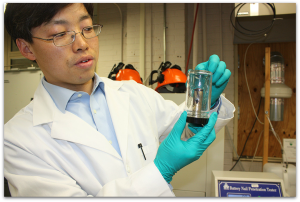
Image: Penn State
With the newly popular hoverboards bursting into flames, safety in batteries has made its way to the public spotlight. To increase lithium ion battery safety, one ECS member is working to develop batteries with built in sensors to warn users of potential problems.
Chao-Yang Wang, 19-year ECS member, is taking on the challenge of making the highly popular lithium ion battery safer in light of demands for smaller, more energy efficient devices.
“Li-ion batteries essentially provide portable power for everything,” says Wang. “Your cell phone charge can now last for a week instead of a day, but it’s still the same size. The battery has a lot more energy density, you are compressing more and more energy into a smaller space, and you have to be careful when you do that. Our job is to come up with solutions to provide safety while at the same time increasing performance.”
While lithium ion batteries are typically safe under normal conditions, the battery’s flammable electrolyte solution could overheat and catch fire if it is punctured or overcharged.
This from Penn State:
Penn State researchers are delivering greater safety by placing temperature sensors inside Li-ion batteries to monitor internal temperatures, detect problems, and provide early warning for intervention. This technology is called internal reaction temperature sensing (RTS).
While external sensors exist to measure battery temperature, it is often too late to avoid destruction by the time those sensors read the high temperature levels. The internal sensors can directly monitor the temperature spikes and shut down the flow in the battery if levels get too high.


